My career has been as a professor of Art History
at universities in the U.S. and Italy.
I have a Ph.D. in Renaissance and Classics. I’m also a lecturer at various museums. As a scholar, my writing experiences centered mostly on dry, academic articles about abstruse themes. There is no drama or suspense in an article about marriage and heraldic symbolism in Botticelli’s Primavera.
Then again, I never got a rejection letter, so I was unprepared for them.
How the Invention of Texting Ruined My Love for Teaching
I loved teaching until the invention of texting. Around 2006, my students became less motivated and more entitled. They argued with me about grades.
I decided to stop teaching eighteen- to twenty-two-year old adults and switched to writing fantasy for middle graders. The middle grade years are the golden age of reading, when children are still willing to believe in magic and yet sophisticated enough to understand multi-layered stories.
My Journey from Endless Queries to Self-Publishing
I began my first book, The Crystal Navigator, in 2009 and, over the next four years, sent out three-hundred plus query letters. Some agents asked for full reads, but then passed.
An editor at Scholastic loved it and wanted to publish it. They had it for months until they finally passed because they were worried about it not having broad appeal. I sent the book out much too early.
I continued to edit throughout the lengthy query period. I re-wrote and polished until I felt as if I couldn’t breathe. After four harrowing years of despair and self-doubt, I hired an artist to paint a great cover and self-published the book in 2014.
The book received a Mom’s Choice Silver Medal and a Readers’ Favorite Bronze Medal for Best Educational Book of 2015, as well as a great Kirkus review.
Despite the Awards, I Don’t Feel Like a Real Writer
No matter how many awards my books win, or great reviews they get, I don’t feel like a real author. In my mind, the book was not published by a real publisher because it wasn’t good enough.
It’s often humiliating to be a self-published author: you’re barred from literary festivals, independent bookstores won’t carry your book, and most respected reviewers won’t review self-published books. I felt like a beggar, beseeching school libraries to accept it.
I’m happy to say that middle schools in MD. MA and DC carry The Crystal Navigator, and some even have it on their reading lists. Children love that one of the characters in the book is inspired by my Corgi, Wilbur. I have been invited to speak to middle-schoolers and I treasure the letters they’ve sent me.
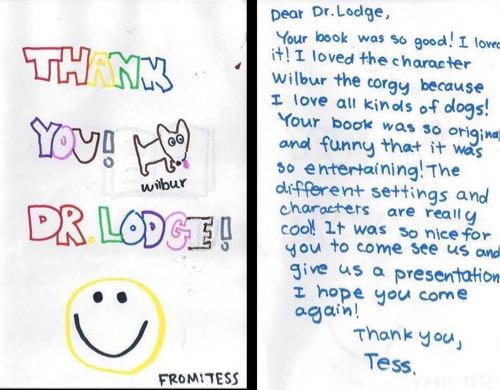
I’m Obsessed with Being Validated by a Publisher
Rejection is a soul-lacerating experience for anyone, and it has created in me an obsession to get published traditionally. The gnawing obsession with being validated by the acceptance of a publisher, preferably an exclusive one like Little, Brown or Houghton Mifflin, is always there in my mind.
The thing about obsessions is that they isolate you from everything else in your life. Writing does that too, but my obsession with not feeling like a real writer is a waste of valuable time I should have been spending with family.
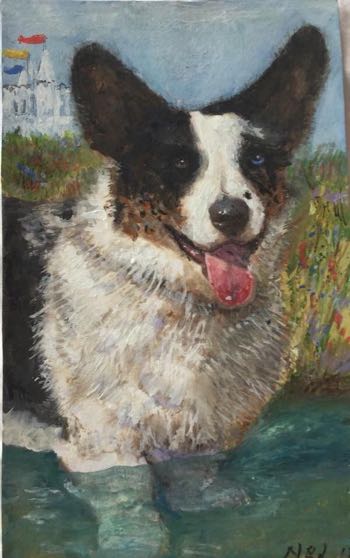
How Self-Publishing Brought Me a Traditional Publishing Deal
Despite my obsession, I self-published and immediately began to write another book. I love my characters too much to abandon them.
I got an idea for a mystery when I read in 2002 that the Louvre had measured the paint layers of the Mona Lisa with something called a Spectrographic Scanner. I thought, what if the dreaded Scanner infected the painting with a molecule-destroying syndrome that would eventually cause it to be sucked into a Black Hole?
So, I wrote a sequel to The Crystal Navigator. Mona Lisa’s Ghost, a mystery, won the Gold Mom’s Choice Award, the Gold Readers’ Favorite Award, and caught the interest of bloggers and journalists.
It was, in addition to The Crystal Navigator, published in Spanish by Editorial Kolima. Yay! A real publisher, only not a U.S. one. Mona Lisa’s Ghost is now being considered for a movie by Wind Dancer Films.
When I Lost My Beloved Dog, My Writing Stopped
Last February, in the middle of writing my third book, my beloved dog, Wilbur, the inspiration for both books, died. I was and still am shattered. I can’t explain how much he changed my life. He was funny, endearing, witty, befuddled and loving. If you read my books, you’ll see.
As a result, I haven’t been able to write the ‘Wilbur Chapters’ of my third book. I feel hollowed out without him. I don’t know if you’ve ever gone through the loss of a dog, but it’s the saddest thing I’ve ever been through. I won’t ever recover from it.
So, I’ve let that third book languish since February. With the arrival of a Corgi puppy, Edward, I’m beginning to think I can start writing again.

The Years Spent Writing are Filled with Health Issues
You’re in kind of space capsule while you’re writing a book. Hunched over, often cold, too immersed to get a sweater, fingers numb.
Then, there are the times you can’t sit still. I liked to line up my pencils, so they were all facing north, or I would stand gazing into the refrigerator for five minutes. I’ve had back and shoulder pain, anxiety, bouts of crying over rejection.
In fact, I would say that the years we spend writing are filled with health issues. And I have only been writing for eight years! I’ve had neck and back pains from sitting or standing at the computer. Sometimes, I pass the computer on the counter and think, “I’ll just edit this paragraph,” but then I’ll look up and it’s been hours.
I’ll always be little neurotic; it comes with being creative. I have found that even the time when I’m not writing, I’m still working toward finishing a book, cogitating, reworking scenes, tying up threads. I agonize over plot. I think it’s the hardest part of writing.
Now, the good part. There is an immense feeling of exhilaration, relief, and accomplishment when you finish and know you have created something good. That feeling is enhanced by children who tell you that your book inspired them to want to write.
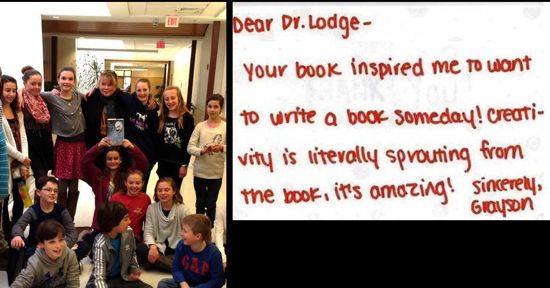 Yoga Doesn’t Help Me, but Painting Does
Yoga Doesn’t Help Me, but Painting Does
I haven’t found meditation (I fall asleep,) or yoga (I hurt myself,) or running (shin splints) to be helpful. However, I love to mow the grass and shovel snow. The latter helps anxiety enormously.
I look for beautiful pieces of material on Ebay and sew a scarf, which is all I know how to make, but I also paint. I did the illustrations of Wilbur for both books. Watercolor is a wonderful freeing medium that allows you to splash color around without being too precise.
Just as when I’m writing, when I’m painting, drawing, gardening, collecting rocks on the beach, I enter a zone where I don’t exist. It’s pure focus. For a few hours, I put my mind in a drawer and exist on another, ethereal level of being.
So, maybe, the answer is to take breaks from writing. Do something that doesn’t require you to think at all, something where you can just be. The writer part of your mind is still working creatively, but it’s in the distance.
I guess this is a little like meditating, but you’re not just sitting. You’re still doing something creative. Anything that gets you into that mental state in which you’re fully immersed in a feeling of energized focus, full involvement, and enjoyment in the process of the activity.
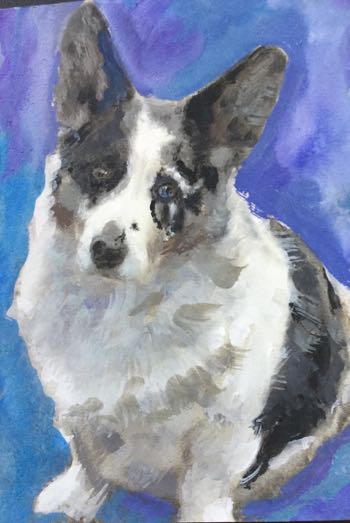
Advice for a Young Writer: Take Small Steps
My advice to a person who is beginning to write would be to keep doing it. If you don’t write, you will always have nothing except an idea for a great book.
Take small steps. Write for twenty minutes at a time. Anytime. If you can’t think of anything, just sit in front of your computer and stare at the blinking cursor. I once wrote a story of an evil mother “Bored” who bellowed messages at writers about fatal errors and browbeat the cursors into doing backflips and cartwheels if the writer didn’t type fast enough.
I would tell the writer to ignore the rules, ignore all the “how to write” books. The rules paralyzed me: never use an adverb, never use the passive tense, or the word “suddenly.”
I would encourage her to avoid extraneous description, no matter how beautiful. Read your book aloud. I guarantee you there will be parts where you’ll say “blah, blah, blah.” Delete those parts.
The most important part of writing for children is the storytelling. The writing must excite them enough to turn the page. The writing must be so enticing that they have to know what happens next. One way to achieve this is to end every chapter on a suspenseful note.
In children’s books, every sentence must move the action along, every question must be answered, and every thread tied up. Above all, there must be a happy ending.
* * *
 Nancy Kunhardt Lodge has a Ph.D. in Renaissance Art History. She taught at Universities in Boston and Washington, D.C. for twenty years. She decided to stop teaching and write children’s books because they sustained her as a child.
Nancy Kunhardt Lodge has a Ph.D. in Renaissance Art History. She taught at Universities in Boston and Washington, D.C. for twenty years. She decided to stop teaching and write children’s books because they sustained her as a child.
She wrote her first book, The Duck Convention, when she was six. Now, she’s written several Lucy Nightingale books in memory of her maternal Grandmother, Dorothy Meserve Kunhardt, author of the ground-breaking books, Pat the Bunny, Lucky Mrs. Ticklefeather, Little Peewee, and many more books for young children.
For more information on Nancy and her work, please see her website.
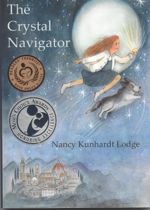 The Crystal Navigator: A Perilous Journey Through Time: Eleven-year-old Lucy Nightingale is a special little girl. She can make things with her thoughts. However, she lost her confidence when her mind went blank during an oral report. Then a dazzling new teacher assigns another report about five paintings.
The Crystal Navigator: A Perilous Journey Through Time: Eleven-year-old Lucy Nightingale is a special little girl. She can make things with her thoughts. However, she lost her confidence when her mind went blank during an oral report. Then a dazzling new teacher assigns another report about five paintings.
Convinced that the only way to get an A on this assignment is to actually talk to the artists, Lucy summons a Wise One to help her with time travel. Her Wise One shows up in the form of a loveable, well-spoken, befuddled Corgi named Wilbur. He wears spectacles and reads brochures about liquid mirrors.
With Wilbur’s magic gadget, the Navigator, to guide them, Lucy and Wilbur fly back to fifteenth-century Florence. The journey turns perilous when the Navigator contracts a virus and propels the two friends into the wrong time.
In triumphing over the obstacles Wilbur sets in her way, Lucy finds her self-confidence and more.
Available at Amazon and Barnes & Noble.
 Mona Lisa’s Ghost: This is the sequel to The Crystal Navigator. During a class video about the Mona Lisa, Lucy Nightingale and her best friend, Sam Winter notice that the painting seems to be melting. Sam thinks it has been attacked by a molecule-destroying syndrome called Zoom Seizure.
Mona Lisa’s Ghost: This is the sequel to The Crystal Navigator. During a class video about the Mona Lisa, Lucy Nightingale and her best friend, Sam Winter notice that the painting seems to be melting. Sam thinks it has been attacked by a molecule-destroying syndrome called Zoom Seizure.
On winter vacation, Lucy and her parents go to Paris where she can investigate. In the Mona Lisa Gallery of the Louvre Museum, Lucy bumps into Melissa Blackwood, a classmate from home. Melissa shocks Lucy telling her that she is the reincarnation of Mona Lisa and that she has come back to steal the painting.
That night, the painting is mysteriously stolen and Lucy must find it before Zoom Seizure destroys it. In an adventure that takes Lucy through the ghost-infested Catacombs of Paris, down underground rivers, and back to sixteenth-century France, she solves a mystery that would shock the world if it were ever made public.
This coming-of-age series is sure to entertain and inspire young readers as Lucy learns to trust her intuition, see herself, others, and the world around her with greater clarity, and to believe in the magic that lies inside every one of us.
Available at Amazon and Barnes & Noble.




I’m so glad you related to my post. There are so many emotional stumbling blocks for writers that force us to take long breaks. However, if the passion is inside you, and it clearly is in you, you don’t abandon your characters. My books are a series and the main reason I won’t stop is that I won’t leave the characters I love, who are real to me and my readers, suspended forever in a book of blank pages. I feel they want to finish the story. I admire your tenacity and triumph.
Nancy
Thanks for the great interview. I relate on so many levels. After my small publisher closed its doors, and my beloved dog Quincy passed away and daughter went off to college, I went into a state of mourning. The problem was, I was two books into a trilogy. The third languished half-written in a notebook. When a full year had passed, and I’d helped my other author friends republish their books, I opened that notebook. It was shocking how bad that draft was. Terrible stuff that didn’t tie together the threads of the first two or do justice to Josie, my protagonist.
So the delay was for a reason! It allowed me the time to work out the story in the recesses of my brain and has made for a better third book. As for the publisher? Pfft. I wanted the trilogy to be out in the world more than I needed that publishing logo on the spine. I did it myself.
Thanks again for your story.